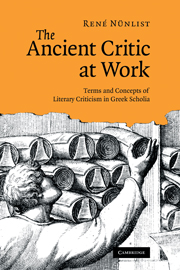Book contents
- Frontmatter
- Contents
- Acknowledgments
- Introduction
- PART I
- 1 Plot
- 2 Time
- 3 Narrative and speech
- 4 Focalisation
- 5 Effects on the reader
- 6 Gaps and omissions
- 7 Poetic licence
- 8 Authentication
- 9 Style
- 10 Allusions, hints, hidden meanings
- 11 Characters
- 12 Mythography
- PART II
- Epilogue
- Glossary of Greek terms
- Editions of scholia
- Other abbreviations
- Bibliography
- Thematic index
- Index locorum
2 - Time
Published online by Cambridge University Press: 29 August 2009
- Frontmatter
- Contents
- Acknowledgments
- Introduction
- PART I
- 1 Plot
- 2 Time
- 3 Narrative and speech
- 4 Focalisation
- 5 Effects on the reader
- 6 Gaps and omissions
- 7 Poetic licence
- 8 Authentication
- 9 Style
- 10 Allusions, hints, hidden meanings
- 11 Characters
- 12 Mythography
- PART II
- Epilogue
- Glossary of Greek terms
- Editions of scholia
- Other abbreviations
- Bibliography
- Thematic index
- Index locorum
Summary
This chapter focuses on the question of how ancient scholars dealt with the various temporal and chronological aspects of a literary text. The first section reviews the several attempts to get to grips with the day structure of a narrative text (the Iliad in particular). Such a day structure is an aspect of a text's story time (erzählte Zeit), in the narrower sense of the word: that is, the story time that spans from the first to the last event of a narrative text (in the case of the Iliad: the fifty-one days from Chryses' arrival to Hector's burial). In this narrower sense, story time does not take into account the timespan of the events that are incorporated by means of external analepsis (events that precede the Iliad) and external prolepsis (events that follow the Iliad). Given the relevance of story time, the second section examines ancient notions of the relation between story time and narrative time (Erzählzeit), that is, the time it actually takes to tell this story. As we shall see, some critics deny that there is an immediate one-to-one correlation between the two. The insight that textual representation need not be identical with ‘how it actually happened’ can also be gathered from the argument that sequentially recounted events in a narrative text must at times be understood as happening in fact simultaneously. The treatment of simultaneous events is discussed in the third section.
- Type
- Chapter
- Information
- The Ancient Critic at WorkTerms and Concepts of Literary Criticism in Greek Scholia, pp. 69 - 93Publisher: Cambridge University PressPrint publication year: 2009



